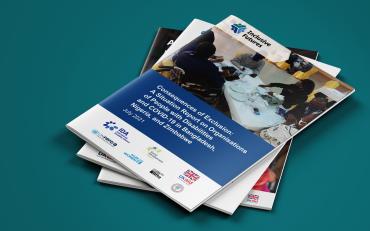The COVID-19 pandemic exacerbated inequalities and barriers to social inclusion for people with disabilities. These experiences of social exclusion have been felt more heavily by women with disabilities and under-represented groups. To address a critical gap in the evidence base, the Disability Inclusion Helpdesk, supported by IDA and others, carried out a rapid assessment of the role of organizations of persons with disabilities (OPDs) during the pandemic, and how the pandemic has affected OPDs’ operations and priorities.
The research revealed that the pandemic had a profoundly negative impact on OPDs. This effect was felt when members needed them most, with dramatically reduced funding hitting alongside increased demand. The research also highlights some positive practices and new opportunities for OPDs.
“We knew this situation was bad for people with disabilities – but when we looked into the detail, it was even worse than we imagined. I was completely in shock. Despite all the hard work by organisations of persons with disabilities, the right to be included in times of crisis still seems far from being achieved,” said Lorraine Wapling, Inclusive Futures technical lead, who worked on the research.
Since the pandemic started, IDA has been doing research to understand how disability-inclusive schemes can respond to the COVID 19 outbreak worldwide, its impact, measures being taken in countries and support the work needing to be done.
What IDA learned through this work has been vital to compile the learnings. They are now being used to encourage disability inclusion across the development and humanitarian sectors.
“Experience shows that it is more effective to plan for inclusion rather than react. Lessons learned in our COVID-19 response can be directly applied to making future crises response and recovery disability-inclusive. We know these lessons have been found before – but the simple fact of the matter is that people with disabilities are still being left behind and these lessons still aren’t being learnt by the sector,” said Susan Pieri, associate programme director for Inclusive Futures.
“There are more than one billion people with disabilities worldwide, that’s around 15% of the global population – we can’t continue to let down such a huge number of people in disaster responses,” she added.
“Our vision is to achieve inclusive development in the context of the Convention on the Rights of Persons with Disabilities (CRPD) and to bring about progressive inclusion of persons with disabilities,” said Dorodi Sharma, IDA’s Inclusive Development Officer. “Inclusive programming around the COVID-19 response can contribute to the larger disability inclusive development in the context of the CRPD and that must be the larger goal.”
The research and learning were compiled as part of Inclusive Futures, a flagship disability development inclusion programme that is funded by UK Aid. Inclusive Futures brings together global leaders and specialists from 16 organisations to improve access to work, education and healthcare, and tackle the stigma and discrimination faced by people with disabilities.
Read Consequences of Exclusion: A Situation Report on Organisations of People with Disabilities and COVID-19 in Bangladesh, Nigeria, and Zimbabwe in English and in Bengali.

